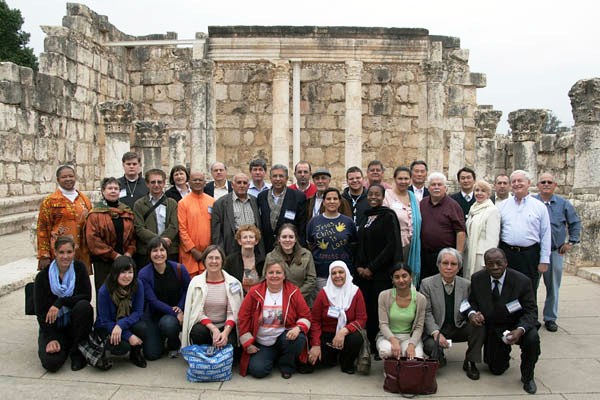![]()
The Words of the Mas Family
|
|
The Words of the Mas Family |

Youth Federation for World Peace put effort and compassion into this month’s Middle East Peace Initiative for International Young Leaders. An initiative to promote understanding and dialogue between individuals separated by customs and religion, the project is a model for interfaith dialogue and young leadership training. This Middle East program reconnected participants from the previous Israeli-Palestinian initiative that took place in Italy. Interfaith dialogue can’t be a one-time event but should be an intentional process of reestablishing common ground. YFWP Interfaith Peace Building in Jerusalem
Lara Harbash is a young professional who attended the summer 2008 Italy program and returned for the December program. A Palestinian Christian born in Jerusalem with a Business Administration degree from Bir zedeit, Lara currently works as an Arabic translator for JIJI Japanese News Company.
“I was not expecting to make peace in Italy, I was not expecting much to be honest,” Lara says. “There was little integration [between the Palestinians and the Israelis]. The conditions faced by Palestinians, the limited space, the border check points, led to heated and emotional exchanges, she remembers. Yet Lara believes in common ground and co existence and she has great interests in peace initiatives: “We can all live together and respect each other’s religions and cultures and still keep our own beliefs,” she says.
Seeing Lara with other past participants at the dinner table smiling and laughing, enjoying each other and listening to updates in their lives, showed that the process could bring about lasting friendships, despite political differences.
The morning of December 18th we began our day with a tour of Old Jerusalem, and later that day we traveled across the border into Palestinian Territory, to experience a comparison of cultures. When walking through the old city of Jerusalem it was immediately noticeable that these places of historical and spiritual significance were not glorified by the average citizen of Jerusalem. While historic sites such as Dome of the Rock and the Church of the Holy Sepulcher were places of worship, they are also tourist attractions.
Further the Old City is a place of residence, people live here work here go to school have families, vendors line the trip selling the same product door to door. It can be kind of jarring especially for a first time visitor to Jerusalem. In your mind you imagine it the site where Jesus was crucified to be a quiet meditative place. It is not. In your mind you imagine the Wailing Wall (Western Wall) to be highly ritualized, but in reality it’s been modernized. There are plastic chairs for sitting down; covering your hair (for women) is suggested but not enforced. To the locals these places are a part of there daily life, reading the holy scriptures or going to worship it just happens to be the place of worship is a famous location or monument that holds the attention of the world.
In the afternoon we traveled to Palestine. Palestine boarder crossing -- easy to get in -- hard to get out. The before and after of crossing the border into Palestine is noticeable. The energy change is distinctively different. As soon as the bus past through and started driving up the street a heavy feeling settles on your chest and goes deep into you heart, and your mind fills with thoughts of lacking. Palestinian delegates welcomed the program participants; they had organized a distinguished panel and prepared lunch for us in one of their finest hotels. Panelists were separated by region and nationality but united in recognition of human equality, an interest in reconciliation, and the desire to improve their situation.
Praying for the strength and guidance from God to help improve the conditions of the Middle East and find solutions for health issues and the general well being of all Palestinians, we were escorted to the dinning room where they had prepared tables for dining and served us Palestinian food. The opportunity to be in Palestine and converse with a Palestinian and hear that person’s personal perspective was an awakening experience for many. Halila, a local Palestinian, talked about her daily life in Palestine. The history and culture of Arabic people is so deeply rooted into the identity of Palestinians. It is a blessing to be able to hear a first hand encounter. Of course Palestinians have diversity among them by way of personality and divisions with in lifestyles. To observe this is to point out the already acknowledged realization -- Palestinian patriotism and Arabic identity and faith are indistinguishable. This is more then enough to unite the people of Palestine.